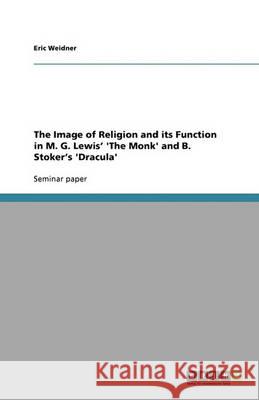The Image of Religion and its Function in M. G. Lewis' 'The Monk' and B. Stoker's 'Dracula' » książka
The Image of Religion and its Function in M. G. Lewis' 'The Monk' and B. Stoker's 'Dracula'
ISBN-13: 9783640335084 / Angielski / Miękka / 2009 / 48 str.
The Image of Religion and its Function in M. G. Lewis' 'The Monk' and B. Stoker's 'Dracula'
ISBN-13: 9783640335084 / Angielski / Miękka / 2009 / 48 str.
(netto: 138,74 VAT: 5%)
Najniższa cena z 30 dni: 145,27
ok. 16-18 dni roboczych
Dostawa w 2026 r.
Darmowa dostawa!
Seminar paper from the year 2006 in the subject English Language and Literature Studies - Literature, grade: 1,7, University of Heidelberg (Institut fur Anglistik), course: Hauptseminar "The Gothic," language: English, abstract: Undoubtedly, religion plays an important role in early Gothic literature. In most cases this does not seem a positive one as can be seen at first glance in Matthew G. Lewis' The Monk (1796). Most likely this also reflects a tendency of the postenlightenment period in which it was written. However, it is interesting to ask how the view on religion and its role in Gothic texts developed in the 18th century. Therefore, I will compare The Monk to Bram Stoker's Dracula (1897) written roughly a hundred years later, which gives a more sophisticated view on religion. In order to structure the wide topic of religion I will present three different perspectives of religion: the societal, the institutional, and the theological. These three strands will first be traced in The Monk and as a second step in comparison to it in Dracula. The theological perspective on religion in Stoker's novel will be allowed more room as this is at the heart of the question whether religion receives a positive or a negative reputation in Dracula. I will argue that religion in The Monk but also in Dracula is indispensable. Furthermore, I will give evidence for the thesis that religion in Dracula is not merely reduced to an apotropaic device against vampires but has a high significance for the whole of the characters' lives. This is further emphasised in the last part of the paper, in which I will compare the endings of both novels. As the different Christian denominations have already been researched in depth, I will only briefly touch on this subject and mainly focus on Christian religion as such.











